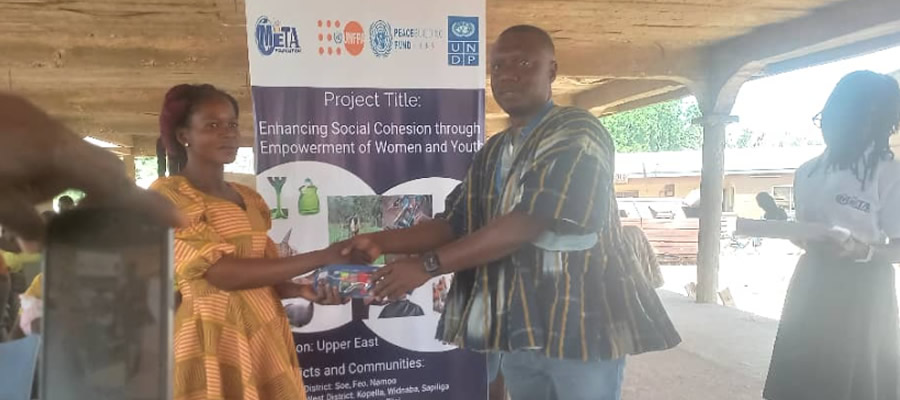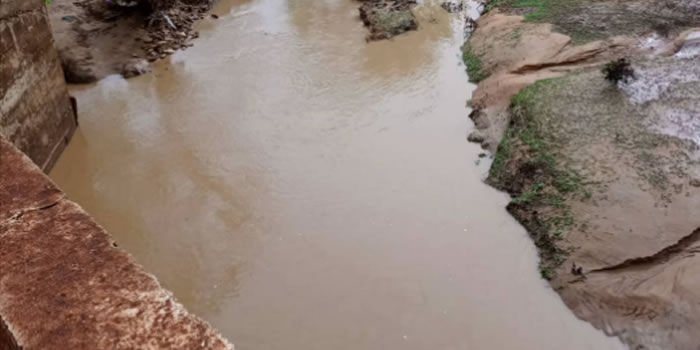

A Brief Introduction
Bongo Trade Center is a CBO; an income generating project initiated by the Bongo District Assembly as part of its district poverty reduction programme. The aim of the initiative was for the Center to assist the local handcraft weavers with production and marketing. Production entails training in product development on various designs to meet customer specifications and demands, whereas marketing involves sourcing for national and international markets for members’ products. This includes exhibitions and sales at trade fairs. The major products are hand woven baskets and hats, some of which are displayed in the pdf file below.
The other purpose was to create an enabling environment for the local women basket and hat weavers for their craft activities for income generation. The District Assembly put up a building comprising of office, store, showroom and weaving hall. The weavers were previously weaving under trees. From the showroom, some of the products are displayed and sold whereas the weavers can come and weave their products as and when they able to from the weaving hall.
Activities and Achievements
Co-operatives
The Center now operates as a co-operative, the purpose being to mobilize savings from members from which they can borrow to assist them with their income generating activities. Funds are a problem during the lean non-farming seasons when cash flow is limited and the members do not have adequate working capital. The members can then borrow from their savings in such times to be able to carry out their income generating activities. Other petty traders in Bongo District expressed desire to be included in the co-operative, so the Trade Center now operates as a multi-purpose co-operative society.
The other purpose for the co-operative is for sustainability. The Assembly initiated the project so that through its income generation activities it can become self-sustaining. The co-operative is deemed necessary to fulfill this vision, where it will use its own savings and income and not always depend on donor funding.
creased market access and production has enabled them have the ability to save from their profits.
Product Development
Product development workshop in progess Continuous product development in baskets weaving has been done since 2003 to capacitate the weavers with knowledge of new designs and different customer specifications. This is a continuous exercise as and when funds are available. The workshops are also meant to improve on quality of products.
Some buyers come and train the members themselves for their specific required designs and then contract the weavers to weave for a specific order. The workshops are normally held at the Center for 25 to 30 participants per time, who are registered members, representing various communities in the district. They are expected to go back and train the other members of their communities. This has born some good fruit as other members of the community have learned from the trainees and have come and joined the co-operative.
Micro-credit
The Center has collaborated with FRALIDEP (Frafra Literacy Development Project) for credit. In 2005, loans were granted to 10 groups district wide amounting to 10m cedes (Gh¢ 1,000). NBSSI (National Board for Small Scale Industries), has also advanced the Center two loans totaling GH¢ 920 to buy materials for production for two orders received.
The external loans are to bridge the gap in the Center’s cash flow as members continue to save from their incomes. It is with this financial constraint in mind that it has been deemed necessary to start the co-operative, being operated as a business enterprise for sustainability. As the co-operative grows, it is anticipated that the interest/profit from loans and income from sales will be able finance operational costs.
Sales and Marketing
Some inquiries have been made via the internet from international buyers, in particular with fair trade organizations. Some positive responses have been received with orders being placed.
The products are displayed in the attached pdf file below.
From product development workshops the co-operative has been able to source good market and in one year (2007-2008), the sales have improved by 500%, bringing improved income to the weavers. Some sales are also made from the co-operative’s showroom.
Through one middleman, our weavers have received 1 training from Export Promotion Council and 2 sponsored by a fair trade importer/buyer for a specific design.
Unfortunately, The Center has been able to attend only two sales trade fairs since 2003, one in Bolgatanga and one in Accra. This is mainly due to lack of the required funds to finance the logistics.
Advocacy
The Trade Center received some funding from BUSAC fund on behalf of the co-operative for a nine months advocacy. The advocacy is to campaign against bush fires that destroy the straw used in weaving. This means that the straw has to be imported from outside the region at a higher cost. Apart from the straw there are other adverse effects caused by bush fires in the communities. For example grass used in roof thatching, soil infertility, other beneficial vegetation, and environmental degradation to mention a few.
Challenges
Production and Seasonality
Most of the buyers are middlemen who give the weavers very low prices for their products. The low prices are a disincentive resulting in low productivity. Direct markets, e.g. with international fair trade organizations often fetch the producers fairer prices.
Savings and Mobilization
Co-operatives depend on members’ savings and interest on loans for their operations. The challenge is that due to the high level of poverty, the savings is limited and it takes time to accumulate substantial amounts for loaning to members and for operational costs. The co-operative is still in its infant stages, mobilizing and educating the community traders for membership recruitment. The results are encouraging; about 200 members have been registered from June 2006 to December 2007. With the education the communities are beginning to comprehend the benefits of co-operatives and ownership concept.
Date Created : 11/18/2017 7:03:37 AM











 facebook
facebook
 X
X
 Youtube
Youtube
 instagram
instagram
 +233 593 831 280
+233 593 831 280 0800 430 430
0800 430 430 GPS: GE-231-4383
GPS: GE-231-4383 info@ghanadistricts.com
info@ghanadistricts.com Box GP1044, Accra, Ghana
Box GP1044, Accra, Ghana